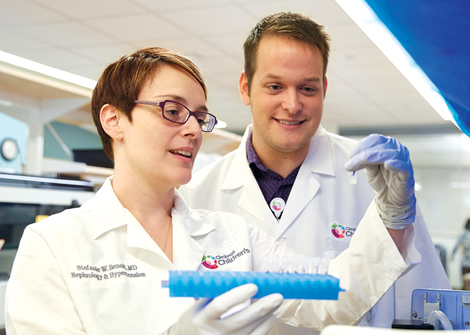A Unique Partnership to Prevent Kidney Injury in Bone Marrow Transplant Patients

A partnership that pediatric nephrologist Stefanie Benoit, MD, MPH, forged with the Cincinnati Children’s Bone Marrow Transplantation Program in 2017 is making significant progress. Phase one involved establishing a standardized approach to diagnosing kidney injury in this patient population. Now, the group is taking steps to mitigate the known mechanisms of kidney injury and conducting research to identify novel ways of predicting, identifying and characterizing kidney injuries during transplantation.
It’s all part of Benoit’s mission to make bone marrow transplants as kidney-friendly as possible. “The kidneys are always at risk of injury during the course of a bone marrow transplant, and the overall morbidity and mortality escalates dramatically with the degree of kidney injury,” Benoit says. “My role is to participate in the pre-transplant evaluation, round with the transplant team, and see bone marrow transplant patients in the follow-up clinic. Together we are finding ways to protect the kidneys during the transplant process. We are all learning from each other.”

The collaboration has led to several accomplishments in the last year:
- Changing the antibiotic algorithm used for bone marrow transplant patients to minimize exposure to nephrotoxic antibiotics. This led to a 70 percent decrease in the unit’s nephrotoxic kidney injury days. This work was published in Biology of Blood and Marrow Transplantation on April 29, 2019.
- Publishing a study establishing a novel strategy for identifying early acute kidney injury in the bone marrow transplant population (Bone Marrow Transplantation, January 30, 2019).
- Securing a grant for a pilot study that will investigate biomarkers of subclinical kidney disease and long-term renal outcomes in pediatric cancer survivors, with a special interest in patients who develop
thrombotic microangiopathy. Benoit hopes to follow these subjects for the next 20 years. - Standardizing clinical consultation before, during and after transplant. Formal nephrology evaluation is now integrated into the routine cancer survivorship protocol.
Future goals include expanding the partnership to help other patient groups within hematology and oncology, including patients with neuroblastoma and those receiving immunotherapy.
“There is so much nephrologists can do for these kids to protect their kidneys, and our partnership with the bone marrow transplant team shows how much of a difference even small changes can make,” Benoit says.

